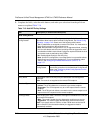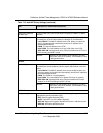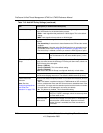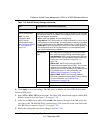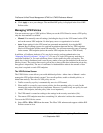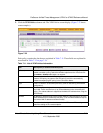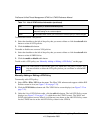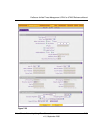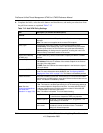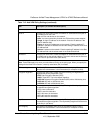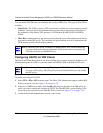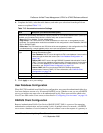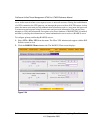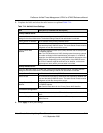
ProSecure Unified Threat Management UTM10 or UTM25 Reference Manual
7-34 Virtual Private Networking Using IPsec Connections
v1.0, September 2009
4. Complete the fields, select the radio buttons and checkboxes, and make your selections from
the pull-down menus as explained Table 7-12.
Table 7-12. Add VPN Policy Settings
Item Description (or Subfield and Description)
General
Policy Name A descriptive name of the VPN policy for identification and management
purposes.
Note: The name is not supplied to the remote VPN endpoint.
Policy Type From the pull-down menu, select one of the following policy types:
• Auto Policy. Some settings (the ones in the Manual Policy Parameters
section of the screen) for the VPN tunnel are generated automatically.
• Manual Policy. All settings must be specified, including the ones in the
Manual Policy Parameters section of the screen.
Select Local Gateway
(UTM25 only)
For the UTM25 only, select a radio button to specify the WAN1 or WAN2
interface.
Remote Endpoint Select a radio button to specify how the remote endpoint is defined:
• IP Address. Enter the IP address of the remote endpoint in the fields to
the right of the radio button.
• FQDN. Enter the FQDN of the remote endpoint in the field to the right of
the radio button.
Enable NetBIOS? Select this checkbox to allow NetBIOS broadcasts to travel over the VPN
tunnel. For more information about NetBIOS, see “Configuring NetBIOS
Bridging with IPsec VPN” on page 7-58. This feature is disabled by default.
Enable RollOver? Select this checkbox to allow the VPN tunnel to roll over to the other WAN
interface when the WAN mode is set to Auto-Rollover and an actual rollover
occurs. This feature is disabled by default.
Enable Keepalive
Note: See also
“Configuring Keepalives
and Dead Peer
Detection” on page 7-54.
Select a radio button to specify if Keepalive is enabled:
• Yes. This feature is enabled: periodically, the UTM sends ping packets to
the remote endpoint to keep the tunnel alive. You must enter the ping IP
address, detection period, and the maximum number of times that the
UTM attempts to reconnect (see below).
• No. This feature is disabled. This is the default setting.
Ping IP Address The IP address that the UTM pings. The address must be
of a host that can respond to ICMP ping requests.
Detection period The period in seconds between the ping packets. The
default setting is 10 seconds.
Reconnect after
failure count
The number of consecutive missed responses that are
considered a tunnel connection failure. The default
setting is 3 missed responses.



